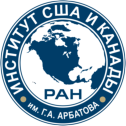
On September 5, 2019, at the Institute of the USA and Canada of the Russian Academy of Sciences, a meeting of the Institute employees with the famous American scientist Robert Legwold, an honorary professor at Columbia University (USA), took place.
During the meeting, R. Legwold presented the main results of a study conducted by the working group of the American Academy of Arts and Sciences on strategic stability in the framework of the project “Answers to the challenges of the new nuclear era.” The expert noted the need for an expanded understanding of strategic stability, the development of new principles of arms control, an individual and multilateral approach to ensuring global nuclear security. R. Legvold also noted that the experts of the working group presented a number of specific proposals to strengthen strategic stability in the current crisis of the arms control regime, nuclear non-proliferation and growing contradictions between the leading world powers.
The subsequent discussion was attended by the ISCRAN scientific adviser S.M. Rogov, ISCRAN Principal Researchers: V.I. Batyuk, V.I. Krivokizhizh; ISCRAN Leading Researchers: V.I. Yesin, P.S. Zolotarev; Senior Researcher ISKRAN V.S. Kuznetsov and others. The American researcher was asked questions about the approaches of the current US administration regarding arms control, the development of new nuclear weapons systems and possible steps that leading nuclear powers could take to reduce the risks of inadvertently unleashing a nuclear war. It was noted that at the official level both in Russia and in the United States there is practically no political willingness to negotiate on these topics.
As for countries such as India, Pakistan and China, they lack the desire to even develop a common understanding of strategic stability, not to mention concrete steps to strengthen it. Moreover, the state of mutual guaranteed destruction, inextricably linked with nuclear deterrence and strategic stability in general, carries enormous and not always justified risks.


